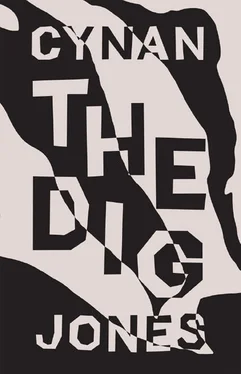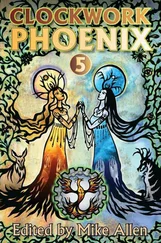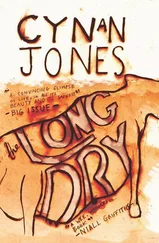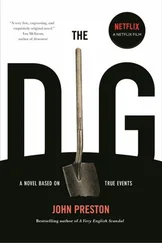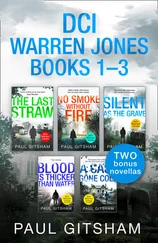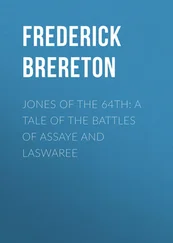The church sat at the very top of the land, bordered with a wall and flanked on one side by dignified beeches. It was the church his mother and father were married in and the church where she was buried, right beside the land, as if she could stretch out in her sleep and feel it there. The day before her funeral, from the house, he had heard the slice of the spades digging the ground.
He knelt by the grave and took the jar and put in her piece of cloth inside its plastic bag and set the jar down for her, pushing it a little into the soft earth.
He cleared away the curled flowers and looked at the grave-marker. It looked plastic and new. It had no weight to it and no permanence. He read her name and put his hand in the dirt above her and he wanted to drag her from the earth again and have her there with him.
At the funeral he was in a daze, had the sure sense that she would be in the house when he returned there. He was at a distance from what was happening. There was the smell of opened soil like when they dug the garden together and he kept looking around for her. He had been driving once and two pigeons had come down on to the road and the car in front had failed to brake and hit one, mashing it to a paste with a dull thunk and brief change in speed. He felt the people look at him then with faces like the one he imagined he wore at that moment. Like they were aware he was about to be flattened by some terrible great thing.
…his days are like grass;
he flourishes like a flower of the
field;
…it is
gone,
and its place knows it no more.
He hears again the parson speak, words that chiseled into his brain like into the gravestone slate about him.
He refused that. I don’t think it is true. He looked down at her and spoke as if to her. I don’t think it’s true. I think a place can remember.
He walked through the gravestones to the church gate and looked out over the sweeping valley. Red kites lifted above him, scanning over the bursts of gorse and he walked out of the church and followed the bridleway along the wall. He touched as was his way the ancient stones with their atlas of lichen mapped across them, looked down at the wasting piles of grass cuttings tipped from the mown churchyard, the scattered sprays of plastic flowers lifted from their places, broke vases and tattered ribbons from long-decayed bouquets, strange colors that were unnatural and minutely carnival there somehow. He hardly registered the van that passed. Did not look up. He was looking at the still-wet earth from the grave on his hands.
A place remembers, he thought. A place has to remember.

The big man saw Daniel there against the wall, clipped the verge briefly with his front wheel as he turned to look back at him. A thought came to him: The man was weak.
He watched the church recede in the mirror, slowed as he passed the farm lane, and let the thought fill out. He took the corner and pulled up upon the verge.
The big man was still uncomfortable. That policeman, he thought. Ag.
He’d taken the phone call that morning and there was not much time to decide things; the men were here tonight.
The first sett he had in mind was too close to outbuildings with men and dogs he did not know. This might be the place.
He’s weak, the big man thought. He’s weak and he is a farmer by himself. He will be occupied. News spread out here, soaked out, and he knew about the loss of Daniel’s wife and why he was at the graveyard. He’s trying to get through on his own.
He knew the setts locally and knew that this sett was relatively distant from the house of the farm. It was walkable from his own place. It’s the one, he said to himself. A man on his own, what can he do?
He got from the van and it lifted and relaxed. In the fields the lambs were bleating habitually and there was a green bolt of new growth in the bank. He crossed the narrow road and stood up into the hedge and looked over onto the field. After the rain, the upper field was fizzing with water. He studied it. He did not know if the badgers were at the sett.
He got back in the van and drove a little way on then parked by a gate and climbed over and cut back along the top of the field. Then he followed the farm lane down, and as he crossed over into a second field a rush of thrushes came off the ground. He walked on, looking at the bank.
Partway down the field there was a run in the bank. The blackthorn that capped it was like a tunnel and the earth was disturbed and excavated like a primitive road. There were dropped piles of bracken by the run as if they had been spilled.
He heard the gate clang the other side of the lane and then Daniel’s weight land. He heard the bumps of footsteps approaching down the track.
He stayed very still.
When Daniel had passed, the big man looked at the gorse and at the thick-packed blackthorn and saw the stiff gray badger hair there.
That will do, he thought. He was decisive. That’s enough of a sign.
He would take the risk that the badgers were there.
He knew the sett was in the woods at the far edge of the farm.
He’d have no reason to be down there, he said.


WHEN DANIEL CAME into the shed the ewe looked immediately incorrect. She was stretched out, camel-prone in the straw and her head was pushed out, the lips working wildly, strained as if trying to get away from the pain at the back of her body.
He swung over the hurdle into the pen of twins and went to her. There were flecks of froth about her mouth as she had been like this for some time, and he thought of the sea and the waves, and of walking into them and the hollow tiredness he felt.
The ewe was distended and her waters had broken but there seemed to be too much thick blood and fluid in the straw, as if it had sloughed out of her, and the other ewes were unsettled and circled well away from her. He swore over and over to himself, and this was his way of finding a grip on things, of bringing it to a dealable realm.
He put his hand into the ewe and she bucked so he had to lean on her and she glazed at him with crazy eyes as she felt him stretch her and try to get his hand in to her womb through the panicked muscles.
He found a head and with his thumb tried to follow its shape, to find the nose and the lobe of the skull and follow it back to the neck. He located a foreleg, bent over like an elbow, and drew it forward to lie against the neck like undoing a knot in the dark, feeling the extraordinary strength of the sheep’s pelvis clamp on his arm.
The ewe panted and groaned and he closed his eyes and tried to see the shape of the lambs inside her with his hands. They are twins, he thought. They can often get crowded and bunched together and he gritted his teeth against the rejective, blunt, maw-like pressure of her pelvis as the ewe tried again to shift.
Something wasn’t making sense. He did not understand and neither did the ewe. He tried to map the bodies inside her, followed a slick throat down to the forelegs, skimmed his fingers out to find a back knee. One lamb. He drew his arm out a little then found the second head, thinking it strange shaped at first, then understanding the soft bones above the eyes, found the flap of an ear and as he moved his hand he understood and the understanding rolled up in him like vomit.
The sheep was livid now in her pain and constantly noisome and he could feel her trying to expel the thing of pain in her, could feel the monstrous lamb being forced into the ungiving bones inside her.
Читать дальше
